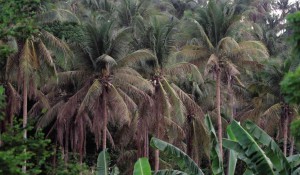Stop use of pesticides vs ‘cocolisap,’ gov’t urged
LUCENA CITY—Concerned stakeholders of the country’s ailing coconut industry on Friday called on the government to stop the use of toxic pesticide neonicotinoid in the war against the coconut scale insect (CSI) or “cocolisap.”
“They are a threat to biodiversity and ecological system functions, human health and wellness, and the economy in general,” the Save the Coconut Industry Movement (SCIM) said in a statement.
The statement was sent by Finesa Cosico, secretary general of the group Advocates of Science and Technology for the People (Agham) and one of SCIM’s convenors. SCIM is composed of scientists, academicians, farmers, environmentalists, businessmen, students and religious people.
SCIM said the active component of the insecticide that is being applied in the affected coconut farm areas is “Dinotefuran,” sold under the brand name “Starkle,” which belongs to the neonicotinoid family of pesticides.
Stay in soil for years
Article continues after this advertisementThe group explained that neonicotinoids “could stay in the soil for years.”
Article continues after this advertisementCiting the Material Safety and Data Sheet of Dinotefuran dated September 2004, SCIM pointed out that the pesticide is scientifically proven to be “highly toxic to bees on an acute oral basis and on an acute contact basis.”
The SCIM also cited the classification made by the US Environmental Protection Agency on Dinotefuran that said the pesticide is “not likely” to be carcinogenic.
However, the SCIM quoted Dr. Romeo F. Quijano from the UP Department of Pharmacology and Toxicology, who stated that the overall toxicity profile of neonicotinoids is found to be “mutagenic and carcinogenic” and that Dinotefuran should be considered “likely to be carcinogenic.”
The group encouraged the government to use safe and environmentally sound pest control measures as an alternative to the use of toxic pesticides.
The SCIM also promotes the use of all pest control strategies under the Integrated Pest Management (IPM) approach that includes physical, botanical, mechanical and biological control, and not to rely solely on a single control method such as chemical control.
“IPM is an effective and environmentally sensitive approach to pest management that relies on a combination of common-sense practices,” the group said.
The group also demanded higher budgetary allocations for coconut research and technology development, conduct research in the coconut farming communities, and to wage a public awareness campaign about CSI, other emerging pests, diseases and how they could be controlled.
Transparency urged
SCIM demanded transparency from the Philippine Coconut Authority on how the P750 million funds were used in the battle against CSI infestation.
President Aquino through Presidential Assistant on Food Security and Agricultural Modernization Francis Pangilinan has allotted P750 million for the administration of pest control strategies, which include the application of a systemic insecticide on tree trunks of CSI-infested trees.
SCIM said the coconut industry has been neglected by the government despite its being one of the top-dollar-earner industries in the country. It said because of which the sector is suffering at the moment from the “potential long-term effects of diseases and pests.”
